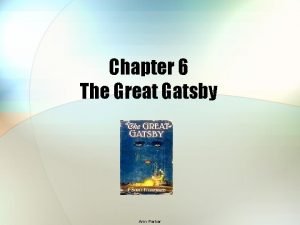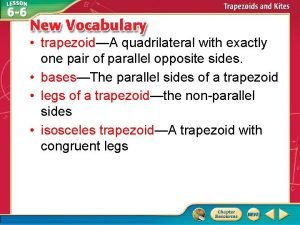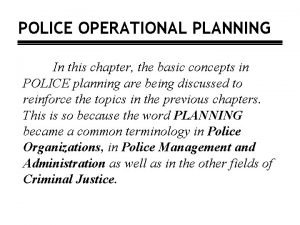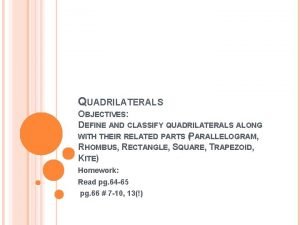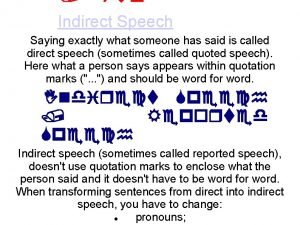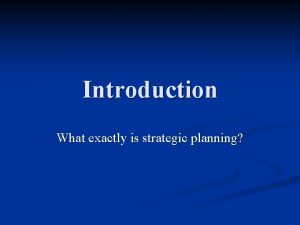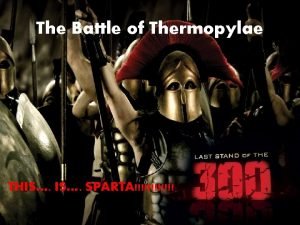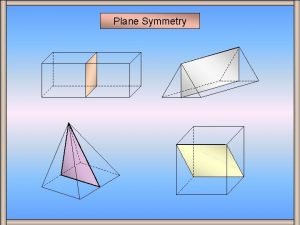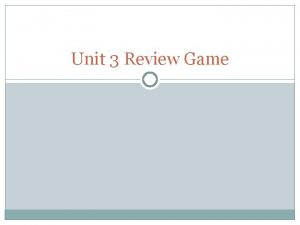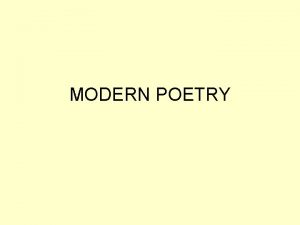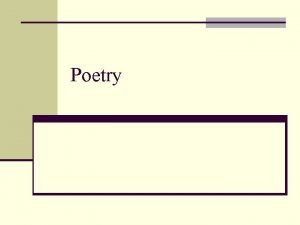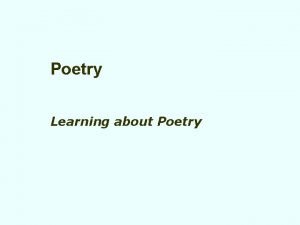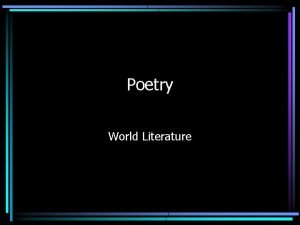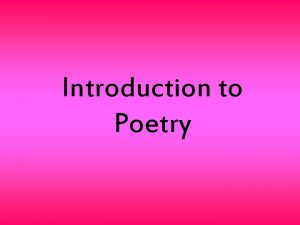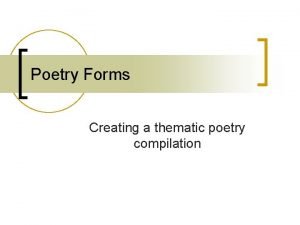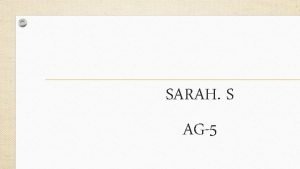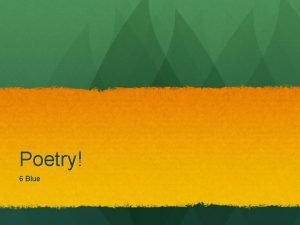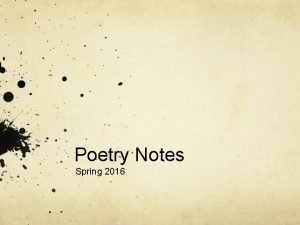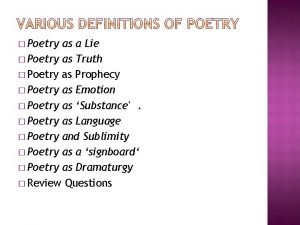Poetry What is Poetry What it is exactly

























- Slides: 25

Poetry

What is Poetry? • What it is, exactly, is less important than how it makes us feel. Eleanor Farjeon (1966) def. • Not a rose, but the scent of the rose • Not the sea, but the sound of the sea • It’s a kind of language that says more and says it more intensely than ordinary language. (Laurence Perrine)

Poetry by Eleanor Farjeon (1966) What is Poetry? Who Knows? Not a rose but the scent of the rose; Not the sky but the light in the sky; Not the fly but the gleam of the fly; Not the sea but the sound of the sea; Not myself but what makes me See, hear, and feel something that prose Cannot, what it is, who knows?

Poetry… by Carl Sandburg • is the opening and closing of a door, leaving those who look through to guess about what was seen during a moment

Elements of Poetry • • Rhythm Rhyme and sound Imagery Figurative language: – Comparison and Contrast • Shape • Emotional force, mood • Diction

Diction • Word choice – Consider connotations and denotations – p. 3 With a wide mouth: 1) talkative, 2) odd looking • Latinate and Germanic Diction – Poetry is often associated with fancy or elaborate vocabulary. – Is French a more poetic language than German? – This need not be the case. Hesse uses simple, clear, unpretentious language – Much more Germanic or Anglo-Saxon than Latinate

Latinate and Anglo-Saxon Diction • Old English is Germanic (Anglo-Saxon) in its forms, structures, and vocabulary. But at around 1100, the Normans invaded England causing French, a romance language (meaning it is derived from Latin) to mix with Old English. During the Renaissance (1400 -1700), thousands more words were imported directly from Latin. • For this reason, English today mixes Germanic and Latinate roots. Often we can find pairs of words, near synonyms, of which one comes from an Anglo-Saxon root and one from a Latinate root. Sometimes there are three closely related words, one each from Anglo-Saxon, from Latin via French, and directly from Latin, as in kingly (Germanic), royal (from French roi), and regal (from Latin rex, regis). • As a (very rough) general rule, words derived from the Germanic ancestors of English are shorter, more concrete, and more direct, whereas Latinate words are longer and more abstract: compare, for instance, the Anglo-Saxon thinking with the Latinate cogitation. • Most “bad” language is of Anglo-Saxon ancestry: compare, for instance, shit (Germanic) with excrement (Latinate).

Germanic Latinate Germani Latinate c anger, rage, ire wrath flood inundate ask begin belief bodily brotherly child come deadly earth fatherly inquire commence creed corporal fraternal infant arrive mortal soil paternal friendly give go god help hen hill motherly new shut amicable provide depart deity assist poultry mount maternal novel, modern close

Poetry for children • Like poetry for adults but may comment in a different way • Poetry that is cute, coy, nostalgic, or sarcastic might be about children, but it is not for them. (Charlotte Huck) • Didactic or preachy poems are usually not insightful or particularly enjoyable.

Poems can be funny

Eletelephony Laura E. Richards Once there was an elephant, Who tried to use the telephant— No! no! I mean an elephone Who tried to use the telephone— (Dear me! I am not certain quite That even now I've got it right. ) Howe'er it was, he got his trunk Entangled in the telephunk; The more he tried to get it free, The louder buzzed the telephee— I fear I'd better drop the song Of elephop and telephong!)

The Burp by Anonymous • Pardon me for being rude. It was not me, it was my food. It got so lonely down below, it just popped up to say hello.

Poems can be fun

Betty Botter bought some butter. "But, " she said, "the butter's bitter. If I put it in my batter, it will make my batter bitter. But a bit of better butter-that would make my batter better. " So she bought a bit of butter, better than her bitter butter. And she put it in her batter, and the batter was not bitter. So 'twas better Betty Botter bought a bit of better butter! How good a tongue twister are you? 40 seconds and over: Too slow. Your grandparents could say the poem faster. 30 to 40 seconds: Not bad. You're probably a faster talker than the President. 20 to 30 seconds: Pretty good. You've been gifted with a fast pair of lips. 15 to 20 seconds: Excellent. You can out talk anyone around. 14 seconds or less: You are a tongue tying champion!

Poems are insightful

My Shadow by Robert Louis Stevenson I have a little shadow that goes in and out with me, And what can be the use of him is more than I can see. He is very, very like me from the heels up to the head; And I see him jump before me, when I jump into my bed. The funniest thing about him is the way he likes to grow-- Not at all like proper children, which is always very slow; For he sometimes shoots up taller like an india-rubber ball, And he sometimes goes so little that there's none of him at all.

My Shadow (cont. ) He hasn't got a notion of how children ought to play, And can only make a fool of me in every sort of way. He stays so close behind me, he's a coward you can see; I'd think shame to stick to nursie as that shadow sticks to me! One morning, very early, before the sun was up, I rose and found the shining dew on every buttercup; But my lazy little shadow, like an arrant sleepy-head, Had stayed at home behind me and was fast asleep in bed.

Poems can express serious feelings

Which Lunch Table ? • Where do I sit? All my friends from last year have changed; my world is f r a c t u r e d l o p s i d e d r e a r r a n g e d. Where do I fit? Nothing is clear. Can already tell this will be a jigsaw year. Swimming Upstream: Middle School Poems by Kristine O'Connell George Clarion Books, 2002

Poems can speak through their shapes (Concrete poems)

"Breezes, " by Court Smith, A concrete poem THE WINDLESS ORCHARD, 31, p. 12

A Gentle Breeze

People are always finding new ways to create poetry

Arms by Dan Weber • http: //www. vispo. com/guests/Dan. Waber/ arms. htm • The poem uses the internet to create poetry in a new form.

Present your poem Take turns presenting your poems • You have 5 -7 minutes each. (Choose a time keeper!) • You want to grab your audience's interest and make them care about your poem. • Be as creative and interesting as possible to share your poem. • Involve your group members as much as possible. – – Ask them to read some parts. Ask questions about the poem. Have them do some actions. Do anything you like, but you want them to enjoy this experience and the poem. • Choose one poem from your group to share with the class.
 What exactly is hiasl
What exactly is hiasl Who is the holy spirit
Who is the holy spirit 1. when does james gatz change his name? why?
1. when does james gatz change his name? why? A quadrilateral with exactly one pair of parallel sides.
A quadrilateral with exactly one pair of parallel sides. She is as fast as a cheetah literal or figurative
She is as fast as a cheetah literal or figurative Police operational planning
Police operational planning Name
Name What exactly is plankton?
What exactly is plankton? Regents
Regents Rules of quadrilaterals
Rules of quadrilaterals Saying exactly what someone has said is called
Saying exactly what someone has said is called Money
Money Exactly
Exactly What exactly is a strategy
What exactly is a strategy Show that there are exactly five 3 digit cube numbers
Show that there are exactly five 3 digit cube numbers Decisive battles thermopylae
Decisive battles thermopylae How many planes of symmetry does a cuboid have
How many planes of symmetry does a cuboid have A painter has exactly 32 units
A painter has exactly 32 units Each month jessica buys exactly 15 big macs
Each month jessica buys exactly 15 big macs What exactly is logistics
What exactly is logistics Congruent segments definition
Congruent segments definition Nested quantifiers
Nested quantifiers Human resources and job design in operations management
Human resources and job design in operations management Traditional poetry vs modern poetry
Traditional poetry vs modern poetry Narrative vs lyric poem
Narrative vs lyric poem Augustan poetry vs romantic poetry
Augustan poetry vs romantic poetry


